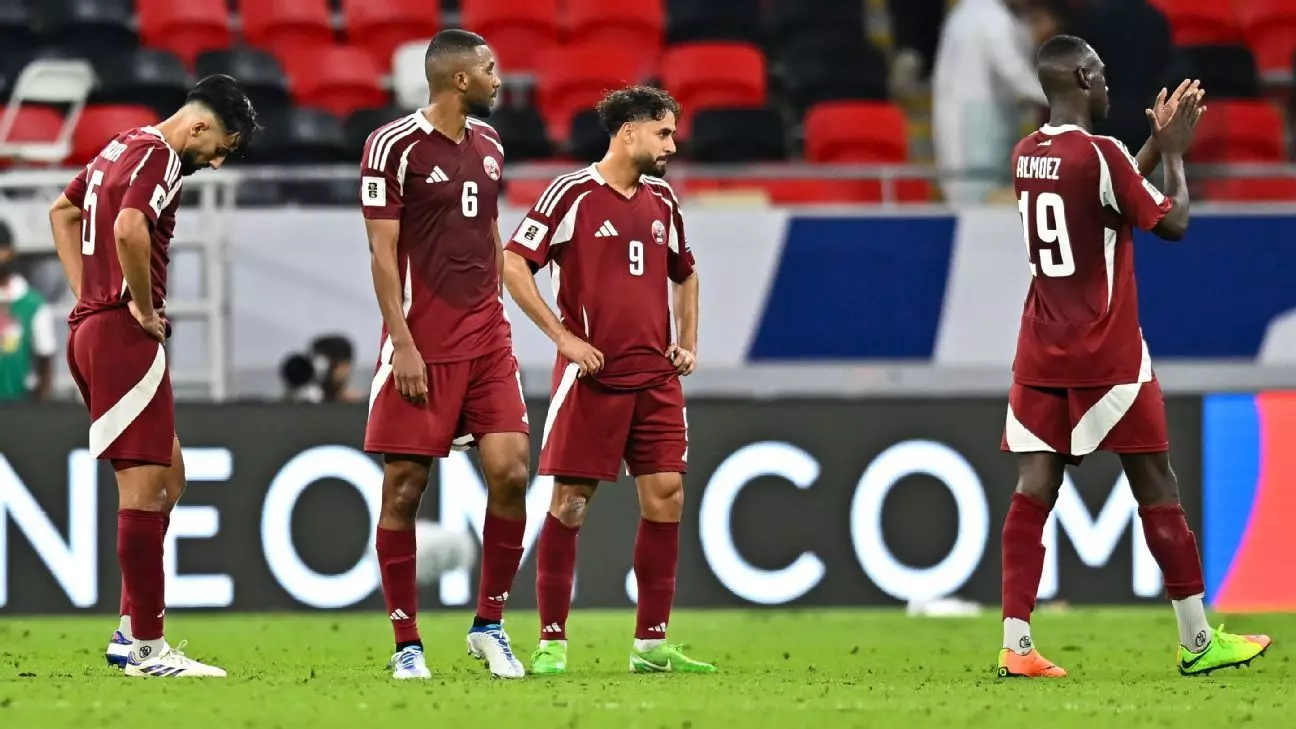In the realm of international football, Qatar’s emergence as a competitive force came to fruition when they hosted the FIFA World Cup in 2022. The expectation following this remarkable debut was that they would solidify their place among the elite nations based on their performance in subsequent qualifiers. With the tournament’s expansion to accommodate 48 teams in 2026, alongside an allocation of eight guaranteed spots for Asian teams, Qatar had every reason to be optimistic about their chances of qualifying again. This optimism was bolstered by their recent successes, having clinched back-to-back AFC Asian Cup titles in 2019 and early 2023. However, the current situation presents a stark contrast to that promise, with Qatar languishing in a disappointing position in the third round of Asian qualifiers.
As things stand in Group A, Qatar finds itself in fourth place, facing significant challenges that have resulted in a mere two victories across six matches. Recent statistics paint a grim picture: Qatar has accrued only seven points and sits three points behind the UAE, who occupies third place, and six points from second-placed Uzbekistan. The gravity of Qatar’s troubles is underscored by their leaky defense, having conceded 17 goals, the worst record among the 18 participating teams. The dire situation was epitomized in a disheartening 5-0 loss to the UAE, where Qatar was effectively outclassed by halftime.
The Facade of Success: What’s Gone Wrong for Qatar?
Given their recent accolades, one might ponder where it has all gone awry for Qatar. The assumption could be made that the focus on immediate success in both the Asian Cup and World Cup qualifiers led to a neglect of future sustainability within the squad. This oversights may explain the persistence of seasoned players like Boualem Khoukhi and Abdulaziz Hatem, despite their advancing ages. However, a closer inspection reveals a different narrative. The core group responsible for Qatar’s prior triumphs is not solely comprised of veterans. Young talents like Akram Afif and Almoez Ali, who are still in their late twenties, have been pivotal in recent matches. Additionally, the emergence of promising young players like Ibrahim Al-Hassan hints at a conscious effort to blend youth with experience.
Qatar’s strategic approach diverges considerably from other regional rivals that have opted for a quick fix through naturalization. The inclusion of Lucas Mendes, their lone foreign-born player, signifies a calculated decision not to compromise the integrity of their squad with transient solutions. This philosophy raises questions about the coaching strategy employed by manager Tintin Márquez. Previously successful at the helm during their Asian Cup victory, Márquez now appears uncertain about his tactical setup, frequently shifting formations and player roles without settling on an optimal system.
The transition that Qatar is undergoing extends beyond just tactical uncertainty; it also spans leadership dynamics within the team. The departure of influential figures such as Hassan Al-Haydos and Saad Al-Sheeb has left significant voids, not just in skill but in team cohesion and guidance. New captain Afif, while a gifted player, embodies a different leadership style—one that relies more on personal brilliance rather than vocal motivation. This inconsistency in leadership may hinder Qatar’s ability to foster a unified team spirit, a crucial element during tough matches.
An additional complication lies in the coaching decisions that have resulted in unpredicted lineup shifts. Márquez’s frequent experimentation may reflect an inability to identify suitable candidates to fill key roles left vacant by departing veterans. The lack of a settled attacking partnership or midfield dynamism has contributed to the erratic performances Qatar has exhibited thus far.
As Qatar faces an uphill battle to secure a place in the next World Cup, there remains a critical need for introspection and determination. With four matches remaining in the qualifiers, Qatar must find a formula that will bring stability and success. The path to understanding their current plight is fraught with obstacles, yet the chance for redemption remains alive.
The focus must shift to combining their youthful talent with the experience of veterans to forge a cohesive unit capable of competing at the highest level. Qatar’s future hinges not only on the development of promising players but also on the ability of their coaching staff to mold a clear and effective tactical identity. The nation’s aspirations, once glittering with the promise of a bright future, now face the test of resilience. Only time will tell if they can navigate these turbulent waters and emerge stronger on the global stage.

